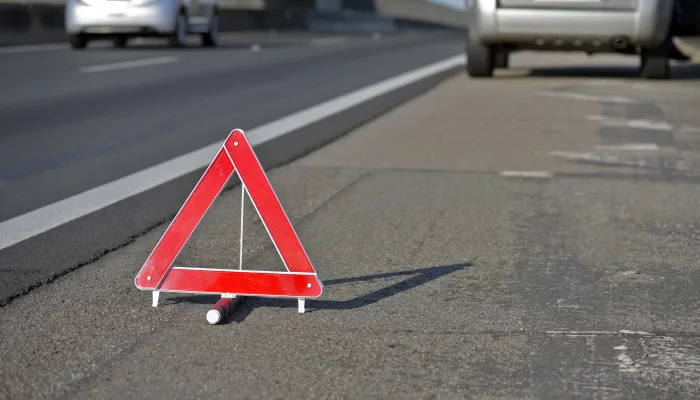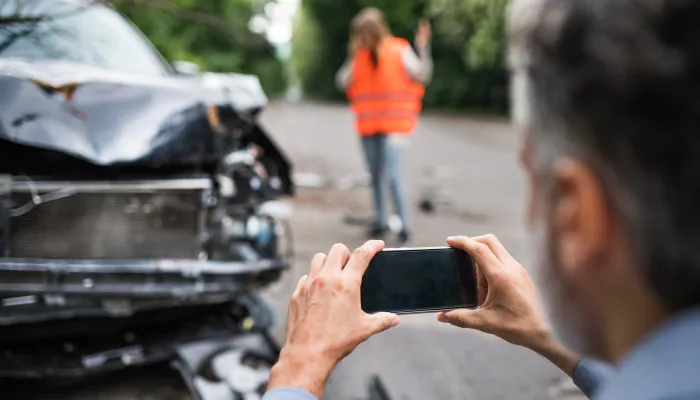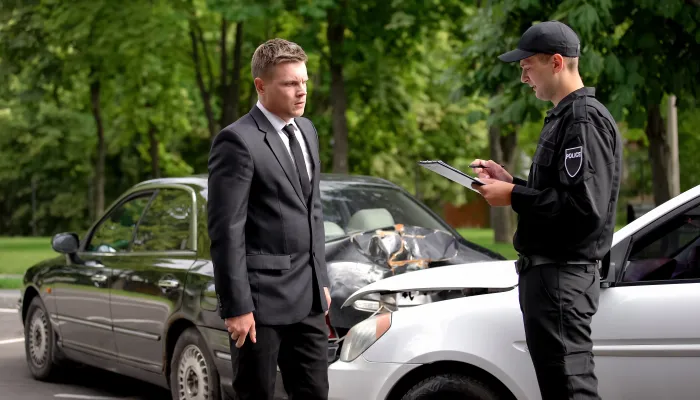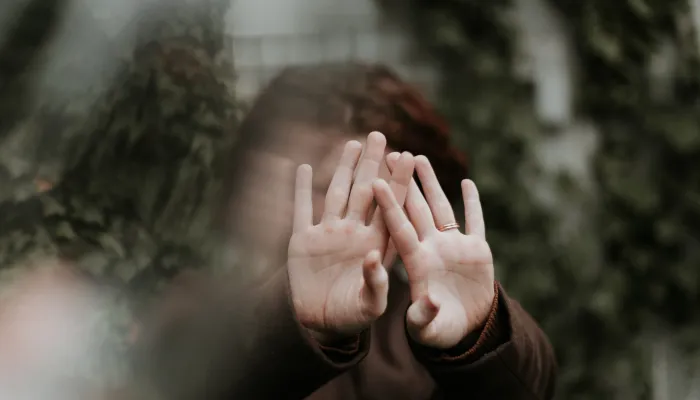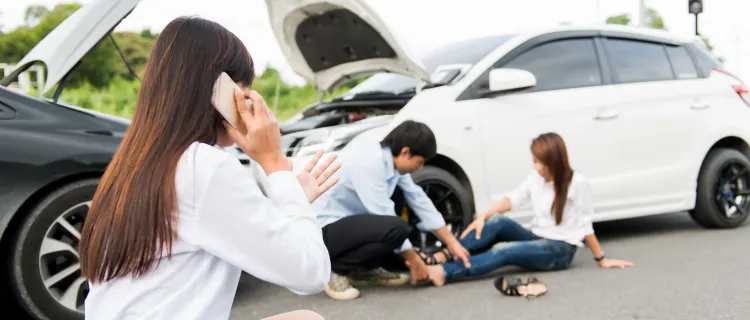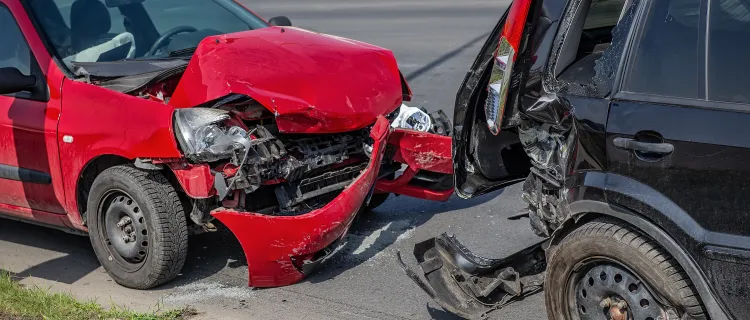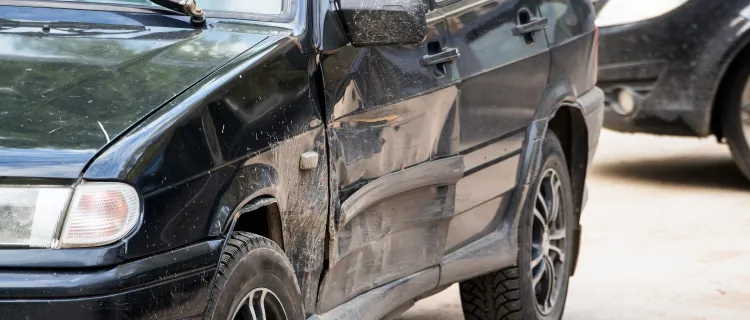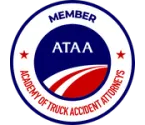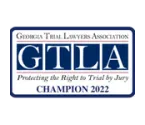When you've been injured in a car crash, the last thing on your mind is dealing with insurance companies and filing legal paperwork. That's where a car accident attorney comes in. With years of experience handling complex cases involving car accidents, our car accident lawyers in Atlanta GA are equipped to help you navigate your situation's legal ins and outs, no matter how complex it may seem.
Why Choose Brooks for Your Car Accident Claim in Atlanta, GA?
You deserve a law firm with you every step of the way, from right after the crash until you get compensation for your injuries and losses. Insurance companies are massive, multi-billion-dollar corporations with teams of lawyers, investigators, and claims adjusters on their payroll. You should not have to battle them on your own. Our clients get to rest and recuperate while we handle all their injury claims.
Atlanta, GA Car Accident Stats & Facts
Atlanta is known for highly congested traffic, bottlenecks, and crashes. It is unusual to drive through the metro area without seeing at least one collision. According to the Georgia Department of Transportation (GDOT), here are some crash statistics for Atlanta.
The total number of crashes dropped significantly in 2020 when fewer people were on the road during the pandemic, but there were still more traffic fatalities in 2020 than in 2019.
During 2016-2020, there were:
What To Do After a Car Accident in Atlanta, GA
Common Causes Of Car Crashes
Drivers face a wide range of risks on the roads, and car accidents can result in serious injuries for those involved. Some of the most common causes of these injuries include distracted driving, speeding, and poor road conditions.
Additionally, many drivers might be unaware that certain medical conditions can also increase their risk of an auto accident injury. For example, individuals with epilepsy or dizziness may be at greater risk of losing control of their vehicle or being hit by another driver. Overall, it is crucial to stay aware and take precautions while behind the wheel to reduce your risk of being injured in a car accident.
Only one thing needs to go wrong in a car accident. For example:
A poorly maintained street could have hazards that can lead to a collision. Hitting a pothole could propel your car off its intended path into another vehicle or object. Road construction is dangerous for the workers and people in motor vehicles because some people do not notice the road construction signs in time to slow down or stop. Weather conditions on mountain roads or during a thunderstorm could make it difficult for drivers to control their vehicles. Debris on the highway can be a deadly hazard.
When people are impaired by alcohol or drugs, their performance at the wheel suffers, making them more likely to cause or be unable to avoid collisions. Even “buzzed” driving can lower a person’s reflexes and judgment enough to cause a crash.
Many Americans work long hours. Also, if a person has a sick child at home or serves as a caretaker for an adult relative, they might be sleep-deprived. Drowsy driving is treacherous for the fatigued driver and others on the road. The effect of driving while drowsy is similar to drunk driving.
Speeding, which can mean either exceeding the posted speed limit or driving faster than is appropriate for the conditions, is a common cause of car accidents. A speeding driver has less time to react to situations on the road. Also, it is easier for a car to go out of control when traveling at an excessive speed.
Distracted driving is finally getting the attention it deserves as a significant cause of car crashes. People often think of texting and talking on cell phones as distracted driving, but anything that takes the driver’s eyes or attention off the road or his hands from the wheel can be distracted driving. Changing the radio station, picking up something that rolled onto the car’s floor, trying to reach something in the backseat, eating, putting on make-up, arguing with a passenger, or merely daydreaming are all types of distracted driving.
Common Type of Auto Accident Injuries
Motor vehicle accidents can cause any traumatic injury. Broken bones, back injuries, head injuries, whiplash, and other soft tissue damage, lacerations, bruises, and damage to the arms, legs, chest, and abdomen are common types of auto accident injuries a person can suffer after a collision.
In addition to the physical injuries, the trauma of a car crash can cause a person to develop emotional or psychological conditions, like post-traumatic stress disorder (PTSD). Also, a person who becomes disabled from severe injuries could develop chronic depression, anxiety, sadness, and loss of enjoyment of life.
How the Investigation Process Works
How Much Is My Car Accident Case Worth?
Every car accident case is different because every person's injuries are unique. The amount of compensation you might collect will likely be different from anyone injured in the same collision, even a passenger in your car.
We will have to talk to you and investigate your situation before determining the monetary value of your injury claim.
The primary categories of compensable damages in car accident injury cases include:
Types Of Car Accidents
- Head On Collisions
- Rear-End Accidents
- Side-Impact Collisions
Contact a Top-Rated Atlanta, GA Car Accident Lawyer Today
Brooks Injury Law is happy to provide a free initial consultation with no obligation. You can contact us today to find out how we can help you. Easily call us or text us at: (678) 813-2202.
FAQs About Car Accidents in Atlanta, GA
What Should I Do Immediately Following a Car Accident in Atlanta, GA?
You will want to protect your safety by notifying the police to come to the crash scene, protect your health and well-being by getting immediate medical attention, and protect your legal rights by talking with an auto accident lawyer in Atlanta.
What Should I Do if an Insurance Company Calls Me?
When you have an Atlanta car accident attorney representing you, the insurance company cannot contact you directly. If they send you a letter, email, or text, or if they call you, you can tell them that you have a lawyer.
Sometimes, the insurance company will call a personal injury claimant and ask them to give a recorded statement. However, we do not recommend that our clients give recorded statements to the insurance company. Despite their suggestions that a recorded statement allows you to tell your side of the story, recorded statements only benefit the insurance company.
They do not send you a transcript of the recorded statement, but the claims adjuster will review the transcript looking for ways to deny your claim or pay you less money than you deserve. When they take things out of context and cherry-pick your recorded statement, they can morph it into something you did not intend to say.
What if the Accident Was Partly My Fault?
Originally, many states used a rule that disqualified people from receiving compensation for their injuries if they were even 1% at fault in causing the accident. This rule caused harsh and unfair results, so as a matter of public policy, Georgia and most other states adopted a different rule, called comparative negligence.
The comparative negligence rule allows an injured person to recover money damages for their injuries from an accident, but the rule reduces the settlement or jury verdict to the injured person's part of the total fault. For example, if you have $100,000 in money damages and the judge said you were 20% at fault, comparative negligence would reduce your verdict by 20%, or $20,000. You could recover $80,000 for your losses.
There are several variations of the comparative negligence rule. Georgia follows the "modified comparative negligence rule," which says that an injured plaintive can only recover money damages if his negligence was less than 50% of the total fault. The 'modified comparative negligence rule' can be read in detail from OCGA § 51-12-33.
Is There a Time Limit to File My Case?
Yes, Georgia imposes deadlines on the amount of time people have to file personal injury lawsuits seeking compensation from the person who caused the accident that injured them. The filing deadline, also called the statute of limitations, depends on the type of lawsuit you want to file and the defendant.
If you are suing a city in Georgia for your injuries, OCGA § 36-33-5 gives you only six months to take legal action. Filing a claim against a county (OCGA § 36-11-1) or the state of Georgia (OCGA § 50-21-26) must happen within one year. If you wish to pursue a government entity for money damages for your injuries, you must first file an administrative claim and exhaust your remedies before taking your case to court.
The statutes of limitations are different if you are suing individuals, non-government organizations, or a business. Here are some of the common filing deadlines in personal injury cases:
Under OCGA § 9-3-33, you have two years to file your case in court for a general personal injury lawsuit.
If your close relative died because of an accident that was someone else's fault, OCGA § 9-3-33 sets the filing deadline at two years.
Cases involving allegations of personal injury from nursing home abuse have a filing time limit of two years from the date of the incident or two years from the date of discovery under OCGA § 9-3-33.
If you got injured by a dangerous product, OCGA § 9-3-33 says that you must file the lawsuit within two years from the date of the incident or two years from the date of discovery, but no later than 10 years.
Medical malpractice lawsuits must get filed within two years from the date of the incident or two years from the date of discovery, according to OCGA § 9-3-71.
Sometimes, the court will extend the statute of limitations for a specific legal impediment, like the injury of a minor child, but usually, courts are strict about the filing deadlines. If your case is outside of the filing deadline, you can talk to us and find out if there is an exception based on the facts of your situation.
How Long Will It Take to Resolve My Case?
Many factors can affect how long it takes to resolve your car accident personal injury claim. We usually advise our clients not to settle their cases before completing their medical treatment. After you settle your claim, you can never go back to get more money from the insurance company. If you later find out that you will need additional medical care, like surgery, you might have to pay for that out of your pocket.
If it looks as though your case is not going to settle before the filing deadline, we can file a lawsuit to protect your right to compensation. Filing a lawsuit does not take away the right to settle your case. The vast majority of cases get settled rather than going to trial.
What Is the Statute of Limitations on Personal Injury in Georgia?
The time limit for filing most personal injury lawsuits in Georgia is two years, according to OCGA § 9-3-33. If you miss the applicable statute of limitations for your case, the law can forever bar you from seeking compensation from the person who injured you through their carelessness.
What Is the Average Car Accident Settlement in Atlanta?
There is no average car accident settlement figure for Atlanta collisions because settlements usually do not get recorded in the courts, unlike jury verdicts and judgments. When a car accident injury claim gets settled, the information is usually private. Often, a nondisclosure agreement prevents any parties from telling people how much money they got or paid.
Also, there is no typical car accident settlement amount because every car accident injury claim is unique. Therefore, the amount of compensation a person who gets injured in a car crash that was someone else's fault can collect will depend on the specific facts of the individual case.
Sometimes, people assume that for each category of injury, like whiplash or a broken leg, the injured person will receive the same amount of money as anyone else with that type of wound. In reality, many other factors can impact the financial value of a person's injury claim. For example:
If the at-fault driver only carries the minimum policy limits required under Georgia law, and your damages and losses are higher than that amount, you might have to claim your automobile policy if you carry underinsured motorist (UIM) coverage for the difference. Another option could be to pursue the at-fault driver's assets or another insurance policy, like an umbrella liability policy.
If you were partly at fault for causing the collision, your proportion of the total negligence could reduce the amount of your settlement.
People can recuperate differently from the same type of injury. One person with a broken leg might be as good as new a year later after physical therapy, while another person might have complications because of diabetes, an infection, or some other cause and end up having to undergo an amputation.
Even within the same category of injury, there are degrees of severity. A clean, simple fracture is likely to heal better than a compound fracture in which the bone shatters into multiple pieces.
These are just a few factors that can affect how much money a person might be able to pursue in a personal injury case for an Atlanta car accident.
How Much Does an Atlanta, GA Car Accident Attorney Cost?
Brooks Injury Law handles car accidents and other personal injury claims on a contingency fee basis. You do not pay upfront legal fees to get our help with this fee arrangement. We understand that after getting hurt in a crash, you might have a stack of medical bills, and you might not be able to work. The last thing you need at this time is another bill to pay.
No matter how much work or time it takes, we wait patiently to get paid until the end of the case when you get a settlement or court award for your injuries and losses. At that time, we receive a percentage of the settlement or verdict. This amount will not come as a surprise because we explain the contingency fee at the beginning of the case and provide a written fee agreement that covers the terms, including the percentage.

